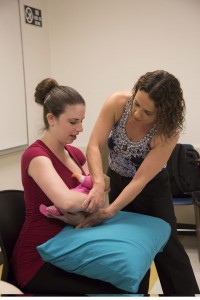CSUN Offers Course in Lactation Education
The American Academy of Pediatrics recommends that new mothers, whenever possible, breastfeed their babies exclusively for the first six months of life. But that’s easier said than done for a lot of women.

Associate professor Merav Efrat (right) working with one of her lactation education students. Photo courtesy of Merav Efrat.
Societal norms and cultural misconceptions still make breastfeeding uncomfortable for some new mothers. While other women struggle to figure out how to successfully breastfeed, education can help. California State University, Northridge is now one of the few universities in the United States that offers lactation education courses to its undergraduate and graduate students.
“Breastfeeding is not normal for us as a society anymore,” said Merav Efrat, an associate professor in CSUN’s Department of Health Sciences who developed the curriculum for the undergraduate and graduate lactation educator training courses. “Women are embarrassed. They are worried they won’t make enough milk. Bottle feeding can seem easier and more acceptable. There are a lot of barriers, and knowledgeable healthcare professionals can help by answering questions and easing concerns. The problem is that there’s also a lot of misinformation and general lack of knowledge, even among healthcare professionals. That’s where our course comes in.”
Efrat said the course was the first course worldwide to earn the designation of a Recognized Breastfeeding Course by the Lactation Education Accreditation and Approval Review Committee (LEAARC). The course is open to any CSUN junior, senior or graduate student is interested in getting trained as a lactation educator, as well as to members of the community, space permitting.
“One strategy for improving breastfeeding rates is to increase the number of healthcare professionals who posses basic breastfeeding knowledge,” she said, adding that the professionals do not necessarily have to work as a lactation educator.
“New mothers come into contact with all sorts of healthcare professionals, from public health educators, dieticians and nurses to pretty much anyone who works in the health care industry,” she said. “It would be nice if whoever the healthcare professional the new mom comes in contact with had the knowledge to answer her questions about breastfeeding, and the skills to offer her the appropriate support, if she chooses to breastfeed.”
Efrat, who worked as a lactation educator and lactation consultant before coming to CSUN, has received more than $1 million in federal grants to develop the lactation educator training course at the university, as well as opportunities for students completing the course to participate in research and community engagement experiences in the area of lactation education.
“In fall of 2010, we launched an experimental undergraduate lactation education training course,” she said. “The course was well received, and now CSUN offers both an undergraduate and graduate lactation educator course that is part of the Department of Health Sciences’ permanent curriculum.”
Efrat said she has been “pleasantly surprised” by the reactions of the students who have taken the undergraduate course.
“We have students who are interested in pursuing a variety of careers in health care, women and men,” she said. “One of the first things I do in the class is ask the students what they know about breastfeeding. They come with all sorts of different ideas and perceptions that are shaped by social norms, cultural influences or just plain misconceptions. It is amazing how much misinformation exists about something that mothers have been doing for centuries. It is very exciting for me to hear students share with me the personal and career-related benefits that they have gained as a result of taking this course.”
Nursing student Ian De Asis, who first earned a bachelor’s degree in public health from CSUN in 2011, said the class has given her the tools to be a better advocate for breastfeeding.
“My background is in public health and I am pursuing a second bachelor’s in nursing,” said De Asis, who expects to graduate with a bachelor’s degree in nursing this December. “As a health educator and nurse, I would be encountering people who have concerns and questions about breastfeeding such as, ‘is it really the best? Won’t my baby have any deficiencies, after all breastmilk isn’t ‘fortified’?’ Now, I am able to confidently address these concerns and provide information, resources and even support which would allow individuals and families to make the best choices and decisions for their infant.”
Efrat and colleagues recently conducted a study to assess the efficacy of CSUN-trained lactation educators implementing phone-based breastfeeding education to low-income Latina mothers from their third trimester of pregnancy until their babies turned six months old. They found that the moms who received the phone-based education breastfed longer and were significantly less likely to supplement their breastfeeding with formula compared to a control group who did not receive the education. In addition to Efrat, the study was conducted by CSUN health sciences professor Salvador Esparza and colleagues from Providence Holy Cross Medical Center in Mission Hills, and the Department of Preventative Medicine in the Keck School of Medicine of USC.
“The lactation educators in this study were all undergraduate students who had completed the CSUN lactation education training course,” Efrat said. “We found evidence that newly trained lactation educators can make a difference in the lives of new mothers and their babies.”
For more information about CSUN’s lactation education program, visit its website at http://www.csun.edu/health-human-development/lactation-education.

 experience
experience